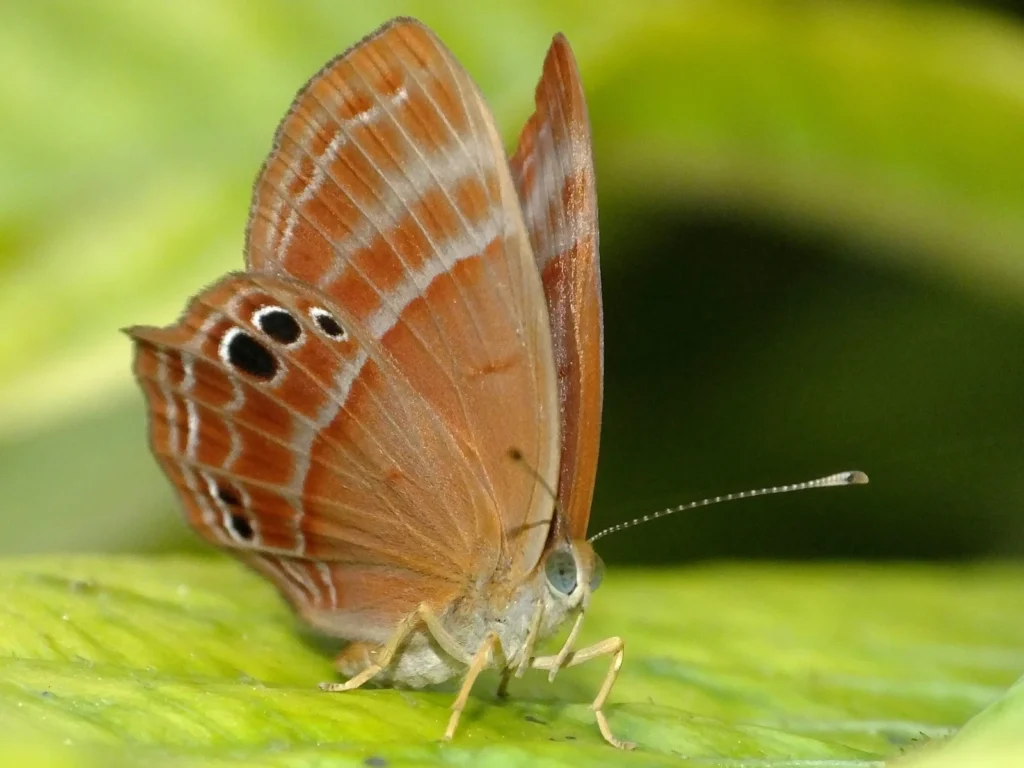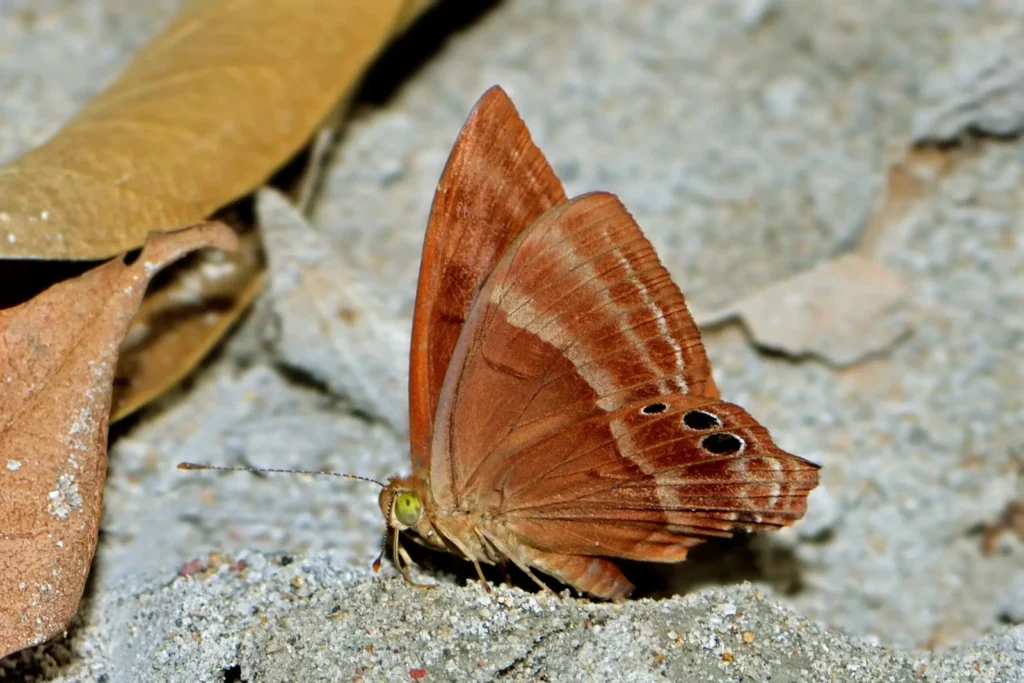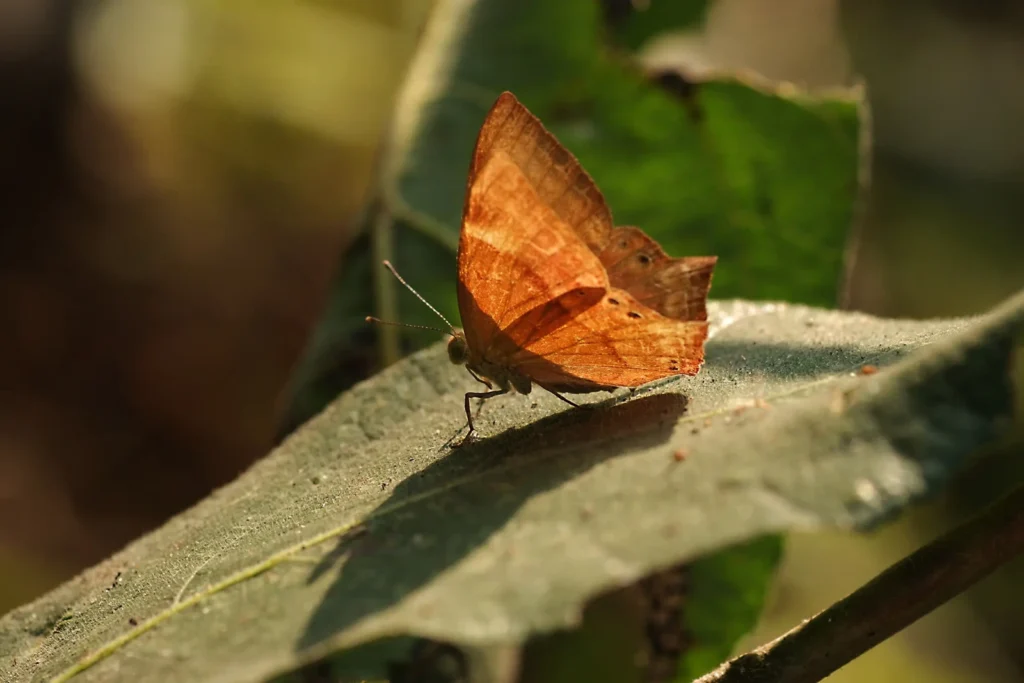Abisara echerius, or "ruby butterfly ", is a prominent member of the riodinidae family (Riodinidae), which lives in tropical and subtropical regions of Asia. Its wings, painted in reddish-brown shades with distinctive white stripes, make it especially recognizable among forest butterflies.
This butterfly is famous fast and maneuverable flight, often hovering in the air and returning back, which resembles the movements of some dragonflies. He prefers shady wet forests, where it is active in the search for nectar and moisture.
In this article, we will look at biology, habitat, life cycle, behavior, natural enemies and interesting facts about this amazing butterfly.

Scientific classification
🔬 Classification of Abisara echerius:
✔ The Kingdom: Animals (Animalia)
✔ Type: Arthropods (Arthropoda)
✔ Class: Insects (Insecta)
✔ Row: Lepidoptera (Lepidoptera)
✔ Family: Rhyodinides (Riodinidae)
✔ Gender: Abisara
✔ View: Abisara echerius
📌 Interesting!
Gender Abisara includes about 40 species of butterflies, most of which live in Asia and Africa.
Appearance and features of the structure
Abisara echerius – medium-sized butterfly, which differs in its unusual coloring and unique behavioral traits.
, Main Features:
✔ Wingspan: 35-50 mm
✔ Color scheme: reddish-brown with white and dark lines
✔ Wing shape: they are rounded and slightly pointed
✔ Oko: large, complex projects
✔ Tentacle: club-shaped
✔ Body: slender, covered with fine hairs
🔹 Key features of painting:
, Main color – dark brown or reddish brown
✅ On the front fenders there are whitish horizontal stripes
✅ The rear fenders often have small dark "eyes" closer to the edge
✅ Underside of the wings – lighter, with more blurry patterns
📌 Interesting!
Abisara echerius is sometimes called "the returning butterfly” because of his habit of abruptly changing the direction of flight.
Habitat and distribution
🌍 Where does Abisara echerius live?
This butterfly is common in tropical and subtropical humid regions of Asia.
✅ Distribution regions:
• India
• Sri Lanka
• Nepal
• Myanmar
• Thailand
• Malaysia
• Indonesia
🔹 Typical habitats:
✅ Rainforests and jungles
Горные Mountain forests at altitudes up to 1500 m
Влаж Wet shrubs, streamsides, and rivers
✅ Plantations, parks and gardens
📌 Interesting!
Often found on forest edges and trailswhere it hunts for flower nectar.

Life cycle and reproduction
Like all lepidoptera, Abisara echerius passes through four stages of development.
Стадії стадии развития:
✅ Egg - 4-7 days
✅ Caterpillar - 2-3 weeks
✅ Pupa - 10-15 days
✅ Imago (adult butterfly) - lives 2-4 weeks
🔹 How does Abisara echerius reproduce?
✔ The female lays her eggs on the leaves of her host plants (usually shrubs or small trees)
✔ Caterpillar it has a protective colorwhat helps her avoid predators
✔ Before pupating the caterpillars, create a small protective cocoon
✔ Adult butterfly flies out preferably in the morning or evening
📌 Interesting!
The caterpillars of some Abisara species interact with antswho guard them in exchange for sweet discharge.
Food habits and role in nature
What does Abisara echerius eat?
✅ Caterpillar:
* Leaves of shrubs and small trees
* Young shoots
✅ Imago (adult butterflies):
* Tropical flower nectar
* Fruit juices
* Tree sap
🔹 What benefits does this butterfly bring?
✔ Pollinates flowers, promoting plant reproduction
✔ It is part of the ecosystem, serving as food for birds and insectivores
📌 Interesting!
Adults can gather in groups of about wet soilto receive mineral substances.

Natural enemies and threats
🔹 Who hunts Abisara echerius?
✅ Birds-sparrows, flycatchers
Па Spiders-catch in the web
✅ Small mammals-mice, bats
🔹 Main threats:
⚠ Deforestation of tropical forests
⚠ Use of pesticides
⚠ Climate change
📌 Interesting!
Thanks to its fast movements, this butterfly often avoids predatorsmaking sharp U-turns in the air.
Interesting facts about Abisara echerius
✔ Quickly changes the direction of flightby avoiding predators
✔ Prefers shady forests
✔ It can feed on tree sap
✔ Often hangs in the air like a dragonfly
Conclusion
Abisara echerius – a small but unique tropical butterfly, which plays an important role in nature due to plant pollination and biodiversity conservation.
📢 This butterfly is another example of the beauty and harmony of wild nature, which is worth protecting!